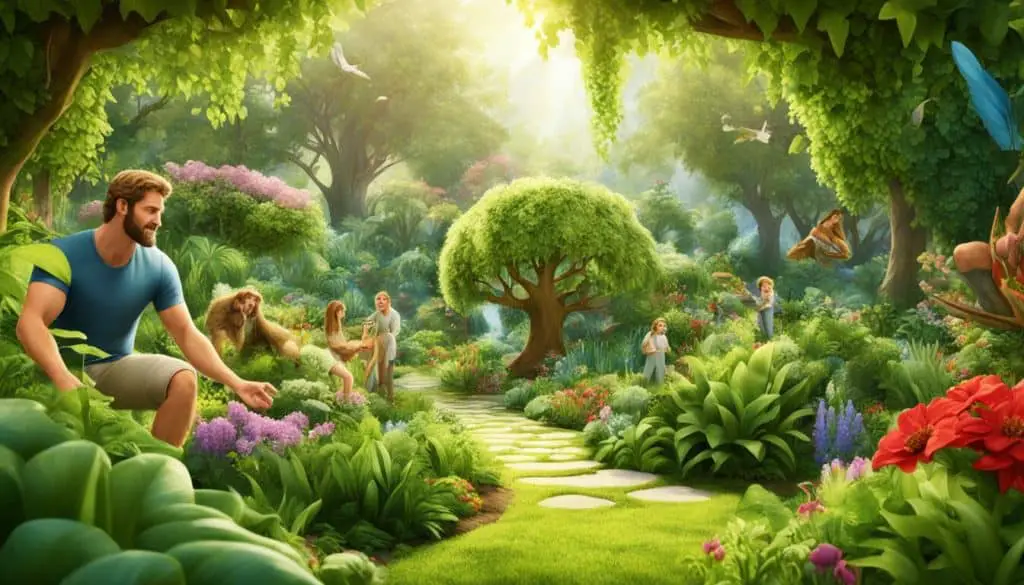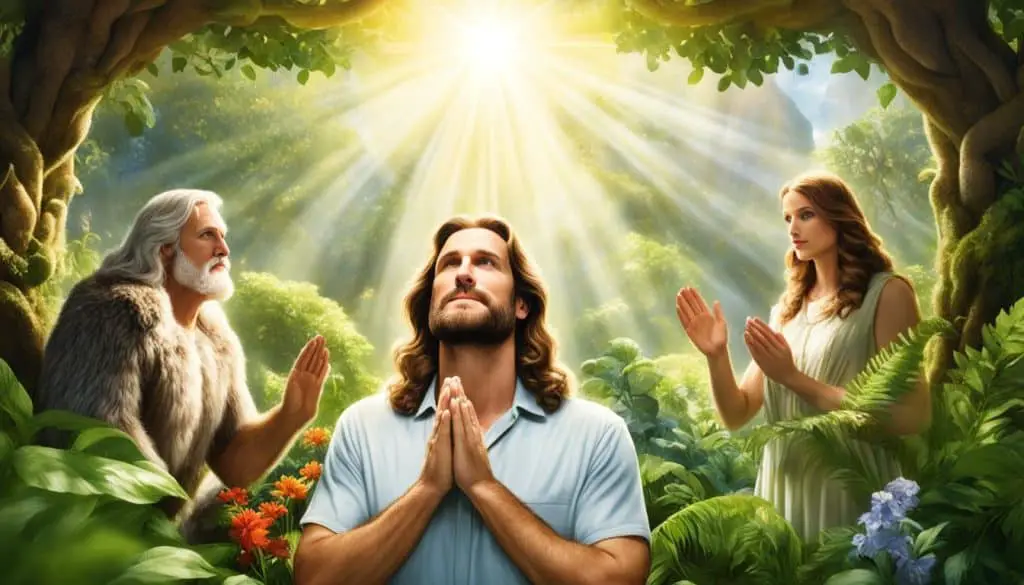Table of Contents
Have you ever wondered what virtues lie within the story of Adam and Eve? How their narrative embodies values like truth, honesty, and justice?
In this article, we delve into the depths of Adam and Eve’s story, uncovering the profound virtues that resonate through their tale. Join us as we explore the truth behind their actions, the honesty they exhibited, and the divine justice that unfolded.
Together, let’s reflect on the continuing relevance of their narrative and unravel the symbolism hidden within their story. Prepare to challenge common beliefs and find unexpected wisdom within this ancient tale.
Make Sure You Watch The Video: I would love for you to subscribe to my YouTube channel as well… Thanks in advance!!
The Truth in Adam and Eve’s Story
When exploring the narrative of Adam and Eve, one cannot overlook the profound truth that resonates throughout their story.
Rooted in the straightforward command of God and the power of His word, their tale unveils essential truths about humanity, relationships, and the consequence of choices.
In the beginning, God spoke and proclaimed the truth of His creation. He commanded Adam and Eve with clarity and simplicity, instructing them to freely enjoy the fruits of the Garden of Eden, with only one restriction: to avoid eating from the tree of knowledge of good and evil.
“But of the tree of the knowledge of good and evil, you shall not eat, for in the day that you eat of it, you shall surely die.”
This command from God highlights the reality of His word, emphasizing the inherent consequences that exist when His instructions are neglected. Here, the truth is revealed that disobedience has its ramifications, setting the stage for the unfolding of Adam and Eve’s journey.
As we delve deeper into the story, we witness the consequences of Adam and Eve’s choice to disregard God’s command. The truth remains that actions have outcomes, and the repercussions of their disobedience shape the course of their existence and humanity as a whole.
The Truth Revealed in Consequences
The consequences faced by Adam and Eve unveil the unwavering truth that God’s word prevails. Adam and Eve’s expulsion from the Garden of Eden, the introduction of pain and toil into their lives, and the eventual mortality they face are all reminders of the truth that actions have consequences.
This reality serves as a powerful lesson, reminding us to consider the weight of our choices and the importance of aligning with the truth God has established. Adam and Eve’s story illuminates the significance of obedience and the enduring impact that truth holds in our lives.
True to the core, Adam and Eve’s story serves as a testament to the immutable nature of truth and the consequences that follow when it is disregarded. Their tale urges us to reflect on our own actions and choices, embracing the truth that lives within God’s word and experiencing the transformative power it holds.
Next, we will explore the honesty represented in Adam and Eve’s narrative, shedding light on the initial state of innocence they experienced and the purity it encompassed.
The Honesty of Adam and Eve
When examining the story of Adam and Eve, it is important to recognize the initial state of innocence in which they existed. In their nakedness, Adam and Eve felt no shame, reflecting a time of pure honesty in their interactions and existence.
Adam and Eve lived in a world free from deceit and pretense. They had no reason to hide their thoughts, emotions, or intentions from one another. This openness and transparency fostered trust and deepened their connection with each other and with God.
In this state of honesty, Adam and Eve were able to fully express themselves without fear of judgment or rejection. They lived authentically, embracing their true identities and embracing the beauty of their vulnerability.
This era of pure honesty in Adam and Eve’s story offers a profound insight into the importance of honesty in our own lives. It serves as a reminder that true connection and intimacy can only be fostered through sincere and open communication.
“Honesty is the first chapter in the book of wisdom.” – Thomas Jefferson
In a world that often encourages deception, it is crucial to remember the value of honesty. By cultivating a sense of integrity and truthfulness in our relationships and interactions, we can build trust, strengthen connections, and live authentically just as Adam and Eve did.

Through their honesty, Adam and Eve exemplify a virtue that continues to resonate with us today. Honesty is not only a moral principle but also a foundation for building genuine and meaningful relationships.
God’s Justice in the Story
When exploring the narrative of Adam and Eve, it becomes evident that the consequences of their disobedience were not only just but also aligned with divine order and justice. God, as the supreme judge and arbiter, ensured that their actions and choices had appropriate repercussions.
Unlike an arbitrary or capricious ruler, God’s justice is rooted in His perfect nature and understanding of what is right and fair. He meted out judgment that reflected the inherent consequences of Adam and Eve’s actions, preserving the integrity of His creation and maintaining the balance of justice.
“For the wages of sin is death, but the gift of God is eternal life in Christ Jesus our Lord.” – Romans 6:23
By imposing consequences such as banishing Adam and Eve from the Garden of Eden and subjecting them to the hardships of a fallen world, God demonstrated that His justice upholds the principles of righteousness and accountability.
The justice of God serves as a reminder that our choices have consequences and that disobedience disrupts our harmonious relationship with God and His creation. Through His just response, God revealed the seriousness of sin and the need for redemption.
Consequences of Adam and Eve’s Disobedience
| Consequence | Description |
|---|---|
| Expulsion from the Garden of Eden | Adam and Eve were no longer allowed to dwell in the perfect paradise of innocence and were severed from immediate communion with God. |
| Pain, toil, and hardship | As a result of their disobedience, Adam and Eve would experience the hardships of life, including pain during childbirth and the need to toil for sustenance. |
| Introduction of sin and death | Adam and Eve’s rebellion introduced sin and its consequences into the world, marking the beginning of human mortality and separation from God. |
| Loss of innocence | Adam and Eve’s disobedience caused them to be aware of their nakedness and to experience shame and guilt, losing their state of innocence. |
God’s justice in response to Adam and Eve’s disobedience serves as both a cautionary tale and a testament to His unwavering commitment to righteousness. It highlights the significance of making choices in accordance with God’s will and the inevitable consequences that follow.
The Purity of Adam and Eve’s World
In the unmarred state of the Garden of Eden, Adam and Eve dwelled in a world untouched by sin, embodying purity in their relationship with God and each other. The perfect harmony and innocence that surrounded them reflected a time of unparalleled purity, where their connection with their Creator remained untainted.
In this pristine environment, Adam and Eve experienced a level of closeness and intimacy with God that can only be described as pure. Their hearts were untainted by doubt or fear, and their actions were driven by genuine love and devotion.
“And the Lord God formed man of the dust of the ground, and breathed into his nostrils the breath of life; and man became a living soul.”
This powerful verse highlights the pure origins of humanity, created directly by the hand of God. Adam and Eve’s existence in this untouched world demonstrated the purity and sacredness of human life.

The Loveliness of the Garden of Eden
Step into the mesmerizing realm of the Garden of Eden, where beauty and harmony intertwine to create a paradise unlike any other. The Garden of Eden is a radiant testament to the loveliness that can be found in every corner of God’s creation.
From the lush greenery that gently sways in the breeze to the vibrant flowers that bloom in an array of colors, this celestial garden encapsulates the very essence of beauty.
The beauty of the Garden of Eden extends beyond its physical attributes to encompass the perfection of creation itself. Every intricate detail, from the delicate petals of a rose to the majestic flight of a butterfly, reflects the meticulous craftsmanship of the Creator.
It is a testament to the divine artistry that surrounds us, a reminder of the beauty that lies within the natural world.
But the loveliness of the Garden of Eden goes beyond mere aesthetics. It is also a place where companionship flourishes and relationships are nurtured.
Adam and Eve, the first human beings, experienced a bond of love and unity within this enchanting paradise. Their deep connection with each other and with God exemplifies the true beauty of human relationships.
“In the Garden of Eden, Adam and Eve lived in perfect harmony with nature and with one another. It was a time of pure beauty and love, untouched by sin or strife.”
The beauty of the Garden of Eden is not limited to its physical surroundings or the relationships it fostered. It extends to the intimate relationship between God and His creation. The garden stands as a testament to the everlasting love and care that God bestowed upon Adam and Eve and continues to bestow upon all of humanity.
The Beauty of Creation
Throughout the Garden of Eden, there are countless manifestations of beauty – from the gentle babbling of the brook to the melodic chirping of birds perched on tree branches. It is a place where nature’s beauty is on full display, inviting all who enter to bask in its splendor.
- The vibrant colors of flowers in full bloom
- The graceful movements of animals at play
- The soothing sounds of cascading waterfalls
- The golden hues of the setting sun
The Garden of Eden truly embodies the loveliness of God’s creation, a reminder of the awe-inspiring beauty that surrounds us every day. It beckons us to appreciate the intricate details, the vibrant colors, and the boundless wonders that exist in the world around us.

As we reflect on the loveliness of the Garden of Eden, let us take a moment to appreciate and cherish the beauty that surrounds us in our own lives.
Whether it be the smile of a loved one, the breathtaking view of a sunset, or the tranquil embrace of nature, may we always remember to embrace and celebrate the beauty in the world around us.
The Good Report of God’s Creation
Celebrate the goodness of God’s creation, as declared by Him when He saw everything He had made and pronounced it “very good.”
God’s creation is a testament to His divine wisdom, power, and love. Through the intricate design of the natural world, from the vastness of the galaxies to the tiniest microorganisms, every aspect reflects God’s perfection.
The beauty and diversity of the Earth’s landscapes, the delicate balance of ecosystems, and the complexity of life itself all point to a Creator who is full of goodness.
When we examine the wonders of creation, we are reminded of God’s generosity and care for His creatures. The lush forests, majestic mountains, and serene oceans are all gifts that provide sustenance and pleasure for both humans and animals.
The variety of plants and animals, each with unique characteristics and purposes, showcases God’s creativity and attention to detail.
Moreover, the intricacies of the human body, with its complex systems and remarkable capabilities, reveal the divine craftsmanship and intention behind our existence. We are fearfully and wonderfully made, a testament to God’s design and purpose for each individual.
“The heavens declare the glory of God; the skies proclaim the work of his hands.” – Psalm 19:1
As we marvel at the goodness of God’s creation, let us also recognize our responsibility to steward and protect it. We are called to be caretakers of the Earth, ensuring its preservation for future generations.
By practicing sustainable living, promoting environmental conservation, and appreciating the beauty around us, we honor and display gratitude for the remarkable creation entrusted to us.
“The earth is the Lord’s, and everything in it, the world, and all who live in it.” – Psalm 24:1
| Reasons to Celebrate the Goodness of God’s Creation |
|---|
| 1. Breathtaking natural landscapes |
| 2. Abundance of diverse plant and animal species |
| 3. Intricate and resilient ecosystems |
| 4. The complexity and wonder of the human body |
| 5. Opportunities for exploration and discovery |
| 6. Inspiration for art, literature, and music |
| 7. Provision of resources for sustenance and enjoyment |
| 8. Reflection of God’s character and attributes |
Let us be in awe of the remarkable world we inhabit, recognizing it as a remarkable gift from our Creator. By embracing and cherishing the beauty and goodness that surrounds us, we can honor God and inspire others to appreciate and protect His creation.

Virtue in Adam and Eve’s Actions
Even in the aftermath of their fall from grace, Adam and Eve exhibited virtuous behavior, indicating a glimmer of their inherent goodness and desire for redemption.
One prominent example is their immediate response to their newfound awareness of their nakedness. Recognizing their vulnerability, they took it upon themselves to cover their bodies, acknowledging their wrongdoing and demonstrating a sense of responsibility.
“And the eyes of both of them were opened, and they knew that they were naked; and they sewed fig leaves together and made themselves coverings.”
This act of covering represents their virtuous attempt to address their wrongdoings and restore modesty. It showcases their willingness to admit their transgressions, take action towards rectification, and strive for self-improvement.
This virtuous act of covering themselves reveals their recognition of the importance of modesty and the need for a moral compass, despite their fallen state. It is a glimpse into their evolving understanding of virtue and righteousness, even in the face of their own mistakes.

The Power of Responsibility
The decision by Adam and Eve to cover themselves reveals their acceptance of the consequences of their actions and their willingness to take responsibility for their choices. They did not shy away from accountability but instead faced the reality of their disobedience head-on.
Though their response may not have fully redeemed them, it demonstrates their capacity for virtue and their desire to align themselves with what is right. It serves as a reminder that even in the midst of our struggles and shortcomings, we have the power to make virtuous choices and seek redemption.
This early act of virtue in Adam and Eve’s story sets the stage for their ongoing journey of self-reflection, growth, and ultimately, the pursuit of virtue in an imperfect world.
God’s Praiseworthy Nature
In the narrative of Adam and Eve, God’s praiseworthy nature shines through in various aspects of His involvement. From the very beginning, His act of creation displays immense power, wisdom, and creativity.
Through His divine provision, He establishes a perfect environment in the Garden of Eden, abundant with sustenance and beauty. Despite the fall, God’s praiseworthy nature is evident in His unwavering love and determination to initiate a plan for redemption.
One of the most praiseworthy attributes of God is His creation. In the book of Genesis, it is revealed that God skillfully crafted the heavens, the earth, and all living beings in just six days.
Every intricate detail of the universe bears witness to His infinite wisdom and expertise. From the vastness of the starry sky to the tiniest microorganisms, God’s creativity and attention to detail are truly awe-inspiring.
Furthermore, God’s provision is an example of His praiseworthy nature. He thoughtfully placed Adam and Eve in the Garden of Eden, a paradise filled with abundant food and resources.
They lacked nothing and were in perfect harmony with their surroundings. God’s provision demonstrates His care and commitment to the well-being of His creation.
“The Lord God took the man and put him in the Garden of Eden to work it and take care of it.” – Genesis 2:15
Despite Adam and Eve’s disobedience and the resulting consequences, God’s praiseworthy nature is evident in His unwavering love and commitment to humanity.
He initiates a plan for redemption, foreshadowing the coming of Jesus Christ, who would provide a way for all to be reconciled with God. This act of divine grace and mercy showcases God’s relentless pursuit of a restored relationship with His creation.
God’s praiseworthy nature is undoubtedly reflected throughout the narrative of Adam and Eve. His acts of creation, provision, and redemption highlight His infinite wisdom, care, and love for humanity.
As we reflect on this remarkable story, may we be inspired to praise and worship the God who deserves all honor and glory.

Exploring the Ramifications of Adam and Eve’s Story
Adam and Eve’s story is not merely a historical account but a rich narrative that carries profound implications and valuable lessons. By delving into their story, we can gain insights into the virtues and consequences portrayed, offering a deeper understanding of human nature and the complexities of our choices.
Lessons Learned from Adam and Eve’s Story
Adam and Eve’s story serves as a cautionary tale about the power of temptation and the consequences of disobedience.
Their actions highlight the importance of obedience, self-control, and accountability in our own lives. By examining their mistakes, we can learn to navigate the challenges and temptations that we encounter.
Implications for Human Relationships
The story of Adam and Eve reveals the intricate dynamics of relationships, both with each other and with God.
It exemplifies the impact of trust, vulnerability, and communication in fostering healthy connections. Understanding their journey can guide us in cultivating strong, loving, and respectful relationships.
Examining the Virtues Displayed
Adam and Eve’s story also presents opportunities to reflect on the virtues they demonstrated amidst their mistakes. Their acknowledgment of wrongdoing and attempts at redemption reveal qualities such as humility, responsibility, and the desire to make amends.
“In accepting their new reality and seeking forgiveness, Adam and Eve exhibit the resilience inherent in the human spirit. Their story serves as a reminder that even in our darkest moments, there is always room for growth, repentance, and restoration.”
The Consequences of Choice
Adam and Eve’s disobedience led to grave consequences, not only for themselves but for all of humanity. This emphasizes the ripple effect of our actions and the responsibility we bear in making choices that align with our values and beliefs.
The Relevance Today
Despite being an ancient story, Adam and Eve’s narrative remains relevant in contemporary life. It prompts us to reflect on our own experiences, the moral dilemmas we face, and the complexity of human nature.
Their story encourages introspection, and through their journey, we can find guidance and wisdom to navigate our own paths.
By exploring the ramifications of Adam and Eve’s story, we gain insights into the human condition, uncover lessons that transcend time, and find inspiration for personal growth and self-awareness.
| Lessons Learned | Implications for Relationships | Displayed Virtues | Consequences of Choice | Relevance Today |
|---|---|---|---|---|
| Obedience | Trust and vulnerability | Humility | Ripple effect of actions | Reflecting on moral dilemmas |
| Self-control | Healthy connections | Responsibility | Personal accountability | Understanding human nature |
| Accountability | Effective communication | Desire for redemption | Lessons in choice | Guidance for personal growth |

The Continuing Relevance of Adam and Eve’s Narrative
As you reflect on the timeless tale of Adam and Eve, it becomes evident that their narrative holds immense relevance in contemporary life and belief systems. The story of Adam and Eve serves as a foundational account that continues to resonate with individuals from various backgrounds and cultures.
Adam and Eve’s story highlights fundamental aspects of human nature, morality, and the consequences of our choices. By examining their experiences, we can gain valuable insights into our own lives and relationships.
Throughout history, Adam and Eve have been seen as archetypal representations of humanity, representing the struggles and triumphs we face in our own lives. The themes of temptation, sin, and redemption featured in their narrative are universal and continue to provide guidance and inspiration to many.
“The story of Adam and Eve teaches us about the fragility of human existence and the importance of responsibility and accountability for our actions,” says renowned theologian Dr. Johnathan Adams. “It reminds us that our choices have consequences and highlights the need for wisdom and discernment in navigating the complexities of life.”
“Adam and Eve’s narrative is a powerful reminder that, despite our imperfections, we have the capacity for growth, redemption, and the pursuit of virtue,” adds Adams. “Their story urges us to seek truth, practice honesty, and strive for justice in our lives.”
Furthermore, Adam and Eve’s narrative offers insights into the nature of God and His relationship with humanity. It illustrates God’s love, mercy, and desire for reconciliation, providing hope and comfort for those who seek spiritual guidance.
In contemporary society, where ethical and moral dilemmas abound, the relevance of Adam and Eve’s story lies in its potential to guide individuals towards making virtuous choices. By examining the consequences of Adam and Eve’s actions, we are reminded of the impact our decisions can have on ourselves and those around us.
“The story of Adam and Eve invites us to critically examine our lives and the world around us,” explains Adams. “It challenges us to consider our values, priorities, and the consequences of our choices, ultimately encouraging us to align ourselves with that which is true, honest, and just.”
As we continue to grapple with questions of morality, purpose, and the human condition, the relevance of Adam and Eve’s narrative remains steadfast. It serves as a timeless reminder of the virtues and challenges that shape our lives and beckons us to seek truth, practice honesty, and strive for justice in the world we inhabit.
Embracing the lessons embedded within Adam and Eve’s story allows us to navigate the complexities of contemporary life with wisdom, compassion, and integrity.
| Key Relevance | Understanding |
|---|---|
| Morality | Provides insights into human nature, morality, and the consequences of our choices. |
| Universal Themes | Highlights the universal themes of temptation, sin, and redemption, resonating with individuals across cultures. |
| Archetypal Representation | Symbolizes the struggles and triumphs of humanity, offering guidance and inspiration. |
| Responsibility and Accountability | Emphasizes the importance of responsibility and accountability for our actions, reminding us of the consequences of our choices. |
| Pursuit of Virtue | Encourages the pursuit of truth, honesty, and justice in our lives, fostering personal growth and redemption. |
How Does Philippians 4:8 Apply to Adam and Eve’s Story?
In the story of Adam and Eve, we can see instances of adam and eve’s faith as they navigate the challenges of temptation and the consequences of their actions. Philippians 4:8 encourages us to focus on what is true, noble, right, pure, lovely, and admirable, which can be applied to Adam and Eve’s story as they strive to remain faithful amidst adversity.
Unveiling the Symbolism in Adam and Eve’s Tale
In the biblical narrative of Adam and Eve, profound symbolism is woven into every aspect of their story. This symbolic tale serves not only as a historical account but also as a rich source of philosophical and theological implications.
One of the central symbols in Adam and Eve’s tale is the forbidden fruit, representing the allure of temptation and the consequences of disobedience. This symbolizes the eternal struggle between free will and moral responsibility, as well as the innate human desire for knowledge and autonomy.
Additionally, the serpent in the Garden of Eden holds symbolic significance. It represents cunning and deception, embodying the forces of evil and the temptations that humans face throughout their lives. The serpent’s role highlights the constant battle between good and evil, morality and immorality.
Moreover, the act of Adam and Eve covering themselves with fig leaves after realizing their nakedness is laden with symbolism. This represents their newfound awareness of shame and the desire to hide their vulnerability. It signifies the loss of innocence and the introduction of self-consciousness that came with their disobedience.
The story of Adam and Eve is a treasure trove of symbolic meanings that continue to resonate with readers across generations. By exploring the symbolism embedded within their tale, we gain a deeper understanding of ourselves, our relationship with the divine, and the inherent complexities of the human experience.






